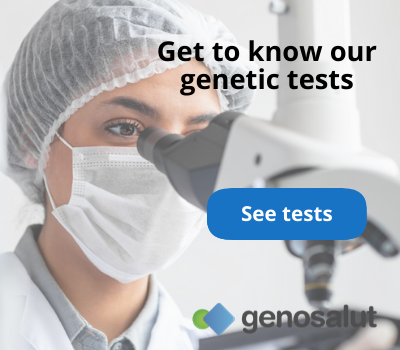Genetic diagnosis in the field of oncology
Between 5 and 10% of cancer patients have a hereditary tumour disease. In these cases, early detection of a genetic disposition:
- Allows appropriate measures to be taken for prevention.
- Allows appropriate measures to be taken for the early detection of the disease.
- It is the basis for individual risk scores.
- It is the basis for a prognostic assessment.
- Therapeutic relevance (personalised cancer medicine or precision medicine).
- Allows to find out if the person has mutations that can transmit an increased risk of cancer to their descendants.
The detection of a genetic predisposition can offer patients access to preventive measures, early detection methods and proactive treatment. In this way, physicians can optimise the health and prognosis of their patients.
Our offer for doctors and their patients
We work with referring physicians
We work closely with referring physicians to determine which tests to order for their patients based on both the medical and safety needs of the prospective parents.
Genetic counselling
We are available to your patients for genetic counselling if they have the disease themselves or are concerned that they have an increased risk of hereditary tumour disease due to their family history.
Wide range of genetic tests for cancer
We offer genetic testing for the most common types of hereditary cancer (breast and ovarian cancer, colon cancer, prostate cancer...).
Rigorous interpretation of results and applicability
Based on our knowledge and experience, we can interpret the genetic (and possibly clinical) results rigorously and make recommendations on possible problems, possibilities and family counselling. This statistical support and clinical significance is absolutely essential, as it provides added value in terms of quality and differentiation compared to other products on the market.
What types of genetic testing for cancer do we offer?
Single gene analysis
This type of testing may be recommended if a family member has had a genetic test that has identified a specific mutation.
Panels
This type of testing allows many genes associated with a particular type of cancer or group of related cancers to be analysed at the same time. This type of testing is often recommended.
Massive sequencing: exome and genome
We examine the whole exome or genome using massive sequencing techniques to find variants associated with an increased risk of developing any type of cancer.
What types of hereditary cancer are there?
The most common hereditary cancers are breast and ovarian cancer, colorectal cancer and prostate cancer.
Hereditary breast and ovarian cancer
Approximately one in eight women (12.5%) will develop breast cancer in her lifetime. Ovarian cancer affects one in 72 women.
Between 5-10% of breast and ovarian cancers are hereditary and the associated mutations are found in the BRCA1, BRCA2, RAD51C, RAD51D, CHEK2, ATM, BRIP1, PALB2, TP53, CDH1 and BARD1 genes. These genes can be tested for in at-risk families.
Hereditary colorectal cancer
The lifetime risk of colorectal cancer in the general population is approximately 1 in 23 (4.3%) for men and 1 in 25 (4.0%) for women. However, this risk can increase by a factor of 4 if there is a family history of colon or rectal cancer.
The two most common syndromes are familial adenomatous polyposis (FAP) and Lynch syndrome (also known as hereditary non-polyposis colon cancer, HNPCC). Other types of hereditary colorectal cancer include juvenile polyposis syndrome, serrated polyposis syndrome, Cowden syndrome, MUTYH-associated polyposis syndrome and Peutz-Jeghers syndrome.
Other hereditary cancers or syndromes associated with an increased risk of developing cancer
Ataxia-telangiectasia, Beckwith-Wiedemann syndrome, Birt-Hogg-Dubé syndrome, Carney complex, Cowden syndrome, familial adenomatous polyposis, familial GIST, familial malignant melanoma, familial pancreatic cancer, hereditary breast and ovarian cancer, hereditary diffuse gastric cancer, hereditary leiomyomatosis and renal cell cancer, hereditary mixed polyposis syndrome, hereditary pancreatitis, hereditary papillary renal carcinoma, juvenile polyposis syndrome, Li-Fraumeni syndrome, Lynch syndrome, Multiple Endocrine Neoplasia Type 1, Multiple Endocrine Neoplasia Type 2, MUTYH-associated polyposis, neurofibromatosis type 1, neurofibromatosis type 2, nevoid basal cell carcinoma syndrome, Peutz-Jeghers syndrome, tuberous sclerosis syndrome, Von Hippel-Lindau syndrome, Werner syndrome and xeroderma pigmentosum.
Can't find a test?
Search by diseases, genes, type of analysis and other criteria in our search engine. If you do not find what you are looking for, please contact us through our contact form as we do not have all the genetic tests available on our website yet.
Do you have any questions about our services?
Opening hours
Monday to Friday from 9.00 am to 1.00 pm
+34 616 59 01 65
info@genosalut.com
Camí dels Reis, 308 (Clínica Palma Planas)
Contact form
Reasons for trusting Genosalut
First genetic diagnosis laboratory in the Balearic Islands
Professionals with experience in medical genetics
Detailed report of the results
Personalised attention for each patient
Wide range of genetic tests
Cutting-edge technology


